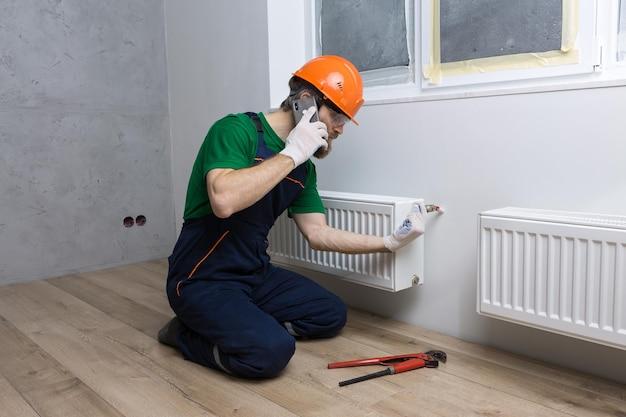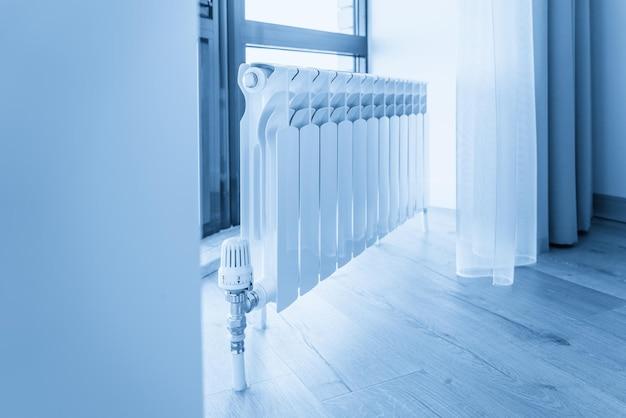Radiators are a common feature in most apartments, especially in colder regions. They play a crucial role in providing warmth and comfort during the winter months. But have you ever wondered how radiators actually work? In this comprehensive guide, we will delve into the workings of radiators in apartment buildings, addressing common questions and concerns.
From understanding the mechanics of radiators to debunking myths about their safety, we will cover it all. Have you ever wondered why radiators sometimes make noise or why they may not heat up as expected? We will explore these issues and provide practical solutions to ensure your radiator functions optimally. Additionally, we will shed light on energy consumption and tips for efficient radiator usage.
So, if you’re curious about the inner workings of your apartment’s heating system, and want to optimize its performance, this guide is for you. Let’s dive into the fascinating world of radiators and unravel the mysteries behind these essential heating devices.
How Do Radiators Work In Apartments
So, you’ve moved into a cozy apartment and are enjoying the perks of modern heating systems. But have you ever stopped to wonder, “How do radiators work in apartments?” Well, my curious friend, you’re about to find out!
The Magic Behind Radiators
At first glance, radiators might seem like simple metal contraptions bolted to your walls. But don’t let their unassuming appearance fool you; these babies are the heart and soul of your apartment’s heating system. Combining science, engineering, and a pinch of magic, radiators keep you snug as a bug in a rug.
Hot Water, Heat, and Happiness
Now, you’re probably thinking, “Okay, but how do these radiators actually warm up my apartment?” Well, let’s break it down. First off, most apartments use hot water-based radiators. Here’s how it works: a boiler or central heating system in your building heats up water to a toasty temperature.
Sending Warmth on a Mission
Once that water reaches the ideal temperature, it’s pumped through a system of pipes and valves all the way to your radiator. Think of it as a little adventure for those teeny water molecules. They travel tirelessly through the building’s infrastructure, carrying warmth like the heroes they are.
The Art of Heat Exchange
Now, here comes the fascinating part. When the hot water enters your radiator, it passes through a series of thin metal fins or coils. These fins increase the surface area, allowing for maximum heat exchange. As the hot water flows through them, the magic of convection takes place.
Convection: Not Just a Fancy Word for Hot Air
You see, when the water in your radiator heats up, it starts radiating warmth into the room. But that’s not all! The air around the radiator also gets in on the action. It becomes all warm and cozy, rises up, and creates a lovely little loop of heat circulation. This process, my dear reader, is called convection.
Dialing in the Perfect Warmth
Now, you might be wondering, “How do I control the temperature of my radiator?” Fear not, because most radiators come equipped with a handy dandy valve that allows you to adjust the heat output. With a twist of your wrist, you can create the perfect ambiance in your apartment, whether it’s balmy or toasty.
Embrace the Warmth, Leave the Science to the Radiators
So, there you have it, amigos. Radiators may seem like mundane features in your apartment, but they are the unsung heroes keeping you warm during those chilly winter months. Now, whenever you bask in the cozy embrace of your apartment’s heating system, you can appreciate the magic that radiators bring to your life.
Stay Warm and Stay Wonderful!
FAQ: How Do Radiators Work in Apartments
Welcome to our comprehensive FAQ-style guide on how radiators work in apartment buildings. Whether you’re a tenant or a curious mind, this article will shed some light on the burning questions you have about these wondrous heating devices. So, buckle up and let’s dive into the world of steamy warmth!
How do radiators work in an apartment building
Radiators in apartment buildings operate based on one simple principle: heat transfer! Most apartments use either steam or hot water as a source of warmth. In steam radiators, water is heated to produce steam, which then travels through pipes to reach the radiator. This steam enters the radiator, where it transfers its heat to the surrounding air, keeping you cozy on chilly days. On the other hand, hot water radiators work similarly, with hot water circulating through the radiator instead of steam.
Are radiators hot to the touch
Absolutely! Radiators are designed to radiate warmth, so they can be quite hot to the touch. It’s essential to be cautious when approaching a radiator, especially if you have little ones scampering around. Remind them that radiators are not alien spaceships they can explore with their tiny hands.
Can radiators start fires
No, radiators are not fire-breathing dragons ready to burn down your apartment. Rest assured, modern radiators are built with safety in mind. They are designed to operate at specific temperatures that prevent them from reaching a point where they can ignite flammable materials. However, it’s always a good idea to keep any combustible items at a safe distance, just to be on the safe side.
Why are my radiators banging
Ah, the symphony of radiator music! Those loud banging noises can be a bit alarming, but fear not, it’s not the radiator trying to break into show business. Banging usually occurs when air gets trapped in the system, causing water to surge and create pressure. This sudden release of pressure results in those loud and dramatic bangs. If your radiator becomes a one-person percussion band, it might be time to bleed the air out or call the maintenance superheroes to save the day.
How do radiators turn on
Radiators are like obedient puppies waiting for their master’s command. They turn on when the thermostat detects that the room temperature has dropped below the desired level. Once the radiator receives this signal, it springs into action, forcing steam or hot water through the pipes and into the radiator, ready to warm your heart (and toes).
Do radiators turn themselves off
Radiators might have the magical power of bringing warmth into your life, but sadly, they haven’t mastered the art of self-awareness. Radiators rely on thermostats (your trusty temperature regulators) or manual controls to turn on and off. So, it’s up to you to give them some rest when the room is at a cozy temperature or crank up the heat when you need an extra toasty embrace.
Do radiator heaters use a lot of electricity
Lucky for you, radiator heaters are not energy vampires that suck your electricity dry. Since radiators mostly rely on steam or hot water produced by central systems, they don’t consume electricity directly. However, if your radiator uses an electric pump or a fan to distribute heat, it may have a small appetite for electricity. But don’t worry, it’s still far less than what your guilty pleasure late-night TV binges gobble up.
Why are NYC Apartments so hot
Ah, the sweet embrace of an NYC apartment during winter – it’s almost like hugging a volcano! The city that never sleeps often faces the challenge of overly enthusiastic heating systems. This can make apartments unbearably toasty. Blame it on the architectural diversity and the extensive interconnected piping systems that occasionally conspire to turn apartments into saunas. Dare we say, that’s the price you pay for living in the concrete jungle!
Do radiators make noise
Apart from the occasional banging performance, radiators are typically well-behaved and don’t engage in noise pollution. However, if you notice continuous hissing or whistling sounds, there might be a different type of performance happening. These sounds could indicate trapped air or a faulty valve, urging you to call the maintenance experts to restore peace and quiet.
Why are radiators cold
A cold radiator is like a snowman in the desert – something is definitely not right. If your radiator lacks that warm touch, it’s time to put on your detective hat. Potential culprits could include air trapped in the system, closed valves, or even an issue with the heating system itself. Investigate and address the problem to ensure your radiator returns to its cozy state in no time.
What happens if you let too much water out of a radiator
If the love for water and your radiator prompts you to drain it completely, beware of the consequences! Removing excessive water from a radiator can damage the system, leading to inefficient heating and increased energy consumption. It’s always important to maintain the recommended water levels and avoid turning your radiator into a barren wasteland. Let the water flow, but in moderation!
How do you turn off a radiator heater in an apartment
Is the sweltering heat making you dream of an ice-cold paradise? Fear not, turning off a radiator is as simple as breaking up with your favorite Netflix show (well, almost). Locate the valve on the radiator and turn it counterclockwise until it’s fully closed. Keep in mind that some systems might have multiple valves, so you may need to repeat the process for each radiator. Ah, sweet relief!
What happens when you bleed a radiator and no water comes out
Ah, the suspense of bleeding a radiator, only to be met with silence – it’s like a magician revealing an empty hat! If you bleed a radiator and no water comes out, it could mean that there is no trapped air in the system or, more seriously, that there is a blockage preventing water flow. In either case, seeking assistance from a professional can help diagnose and address the issue. They might even pull a rabbit out of the hat, or at least fix your radiator!
Does bleeding radiators affect boiler pressure
Bleeding radiators is unlikely to cause a significant drop in boiler pressure. When bleeding, you are releasing excess air from the system, but not altering the water levels that affect pressure. However, it’s always wise to keep an eye on your boiler’s pressure gauge after bleeding, just to make sure there are no mysterious pressure fluctuations.
Why is my apartment so hot in winter
If your apartment feels like a sauna during winter, you might find yourself questioning the laws of physics. The answer, dear reader, lies in the delicate dance between your radiator and the thermostat. If the thermostat is placed near a heat source or exposed to direct sunlight, it might inaccurately detect the room temperature. As a result, your radiator will continue to unleash its fiery heat, leaving you in a never-ending summer. Moving the thermostat away from heat sources can help restore the natural order of seasons in your apartment.
Do you bleed a radiator when it is on or off
When it comes to bleeding radiators, silence is golden. It’s best to bleed radiators when they are turned off to avoid hot water or steam spurting out unexpectedly. Safety first, folks! Make sure the radiator has cooled down, then grab your trusty radiator key and release the trapped air like a seasoned radiator whisperer.
Why are radiators not heating up
Picture this: You’re shivering in your apartment, praying to the radiator gods for some heat, but your radiator remains as cold as an iceberg. Oh, the agony! Several factors could be behind this icy betrayal, such as air trapped in the system, closed valves, or a malfunctioning thermostat. Investigating each of these possibilities and seeking professional assistance will help revive your chilly radiator and restore peace in your frozen abode.
That wraps up our FAQ-style guide on how radiators work in apartments. We hope we’ve warmed your heart and sparked some newfound radiator knowledge. Remember, the next time you cozy up to your radiator, you’ll have a deeper appreciation for the science and magic happening behind its warm exterior. Stay toasty, my friends!

